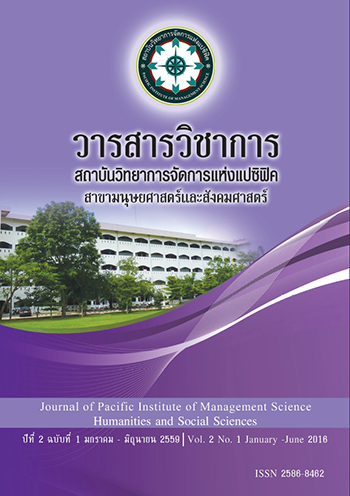สภาพการจัดการเรียนการสอนแบบมอนเตสเซอรี่ ในโรงเรียนบุณยสมบัติวิทยา อำเภอสวี จังหวัดชุมพร
คำสำคัญ:
สภาพการจัดการเรียนการสอนแบบมอนเตส เซอรใี่นโรงเรยีนบณุยสมบตัวิทิยาบทคัดย่อ
การศึกษาครั้งนี้มีวัตถุประสงค์ เพื่อศึกษาสภาพการจัดการเรียนการสอนแบบมอนเตสเซอรี่ และเพื่อศึกษาข้อเสนอแนะในการจัดการเรียนการสอนแบบมอนเตสเซอรี่ ในโรงเรียนบุณยสมบัติวิทยา อำเภอสวี จังหวัดชุมพรประชากรที่ใช้ในการศึกษาครั้งนี้ได้แก่ ผู้บริหาร ครูผู้สอน และครูผู้ช่วย ในโรงเรียนบุณยสมบัติวิทยา อำเภอสวี จังหวัดชุมพร จำนวน 34 คน เครื่องมือที่ใช้ในการศึกษาเป็นแบบสอบถามที่มีค่าความเชื่อมั่นเท่ากับ .971 สถิติที่ใช้ในการวิเคราะห์ข้อมูล ได้แก่ ค่าร้อยละ ค่าเฉลี่ย และค่าเบี่ยงเบนมาตรฐาน ผลการศึกษาพบว่าระดับความเข้าใจของประชากรในโรงเรียนบุณยสมบัติวิทยาต่อสภาพการจัดการเรียนการสอนแบบมอนเตสเซอรี่ ในโรงเรียนบุณยสมบัติวิทยา อำเภอสวี จังหวัดชุมพรโดยภาพรวมอยู่ในระดับปานกลางและเมื่อพิจารณาเป็นรายด้านพบว่าส่วนใหญ่ อยู่ในระดับมากที่สุด เรียงลำดับของระดับความเข้าใจจากด้านที่มีค่าเฉลี่ยมากไปหาน้อย ได้แก่ 1) บทบาทของครูในระบบมอนเตสเซอรี่ 2) เทคนิคการให้บทเรียน 3) หลักการสอนแบบมอนเตสซอรี่ 4) สื่ออุปกรณ์การสอนกลุ่มวิชาการเพื่อพัฒนาด้านภาษาและ 5) ความรู้พื้นฐานเกี่ยวกับการสอนแบบมอนเตสเซอรี่ ตามลำดับ
เอกสารอ้างอิง
บุหงา วัฒนะ. (2536). การจัดการเรียนการสอนแบบมอนเตสซอรี่. พระนครศรีอยุธยา : วิทยาลัยครูพระนครศรีอยุธยา.
ประมวญ ดิคคินสัน. (2534). บ้านเด็ก : การพัฒนาเด็กตามแบบมอนเทสซอรี่. (พิมพค์รั้งที่ 2). กรุงเทพฯ : แปลนพับลิชชิ่ง.
มัลลิกา งามสะอาด. (2553). คู่มือการสอนแบบมอนเทสซอรี่ หมวดชีวิตประจำวัน หมวดประสาทรับรู้ หมวดภาษา และหมวดคณิตศาสตร์ . ประจวบคีรีขันธ์ :โรงเรียนสามัคคีร่วมจิต.
เยาวพา เดชะคุปต์ . (2542). การจัดการศึกษาสำหรับเด็กปฐมวัย. กรุงเทพฯ : แปลน พับลิชชิ่ง.
ภารดี อันนต์นาวี. (2557). หลักการแนวคิดทฤษฎีทางการบริหารการศึกษา. (พิมพ์ครั้งที่ 5). กรุงเทพฯ : มนตรี.
สุจินดา ขจรรุ่งศิลป์ . (2540). เอกสารประกอบการอบรมครูโรงเรียนเอกชนระดับก่อนประถมศึกษาเรื่องจิตวิทยา พัฒนาการเด็ก. สำนักงานคณะกรรมการการศึกษาเอกชน กระทรวงศึกษาธิการ. กรุงเทพฯ : โรงพิมพ์คุรุสภา ลาดพร้าว.
Cheng, E.C.K. (2015). Knowledge Management for School Education. Springer Brief in Education, Hong Kong : Softcover.
Dohrmann, K. R. (2003). Outcomes for Students in a Montessori Program: A Longitudinal Study of the Experience in the Milwaukee Public Schools. Amsterdam : Koninginneweg.
Dohrmann, K.R., Nishida, T.K., Gartner, A., Lipsky, D.K., & Grimm, K.J. (2007). High School Outcomes for Students in a Public Montessori Program. Journal of Research in Childhood Education. 22(2), 205-217.
Mathi, K. (2004).Key Success Factors For Knowledge Management. Master Thesis, Internationales Hochschulinstitut LINDAU, University of Applied Sciences/ FH Kempten, Germany : LINDAU.
Takeuchi, N (2000). SECI (Nonaka Takeuchi). JapanLillard, A.S. (2012,June). Preschool Children’s
Development in Classic Montessori, Supplemented Montessori, and Conventional Programs. Journal of School Psychology. (50), 379-401.
Lillard, A.S. & Else-Quest, N. (2006. September 29). Evaluating Montessori Education.Science. (131), 1893-94.
Lillard, A.S. (2005). Montessori: The Science Behind the Genius. New York: Oxford UP.
Rathunde, K. (2003). A Comparison of Montessori and Traditional Middle Schools : Motivation, Quality of Experience, and Social Context. The NAMTA Journal.28(3), 12-52.
ดาวน์โหลด
เผยแพร่แล้ว
ฉบับ
ประเภทบทความ
สัญญาอนุญาต
บทความที่ได้รับการตีพิมพ์เป็นลิขสิทธิ์ของ สถาบันวิทยาการจัดการแห่งแปซิฟิค
ข้อความที่ปรากฏในบทความแต่ละเรื่องในวารสารวิชาการเล่มนี้เป็นความคิดเห็นส่วนตัวของผู้เขียนแต่ละท่านไม่เกี่ยวข้องกับสถาบันวิทยาการจัดการแห่งแปซิฟิค และคณาจารย์ท่านอื่นๆในสถาบันฯ แต่อย่างใด ความรับผิดชอบองค์ประกอบทั้งหมดของบทความแต่ละเรื่องเป็นของผู้เขียนแต่ละท่าน หากมีความผิดพลาดใดๆ ผู้เขียนแต่ละท่านจะรับผิดชอบบทความของตนเองแต่ผู้เดียว







